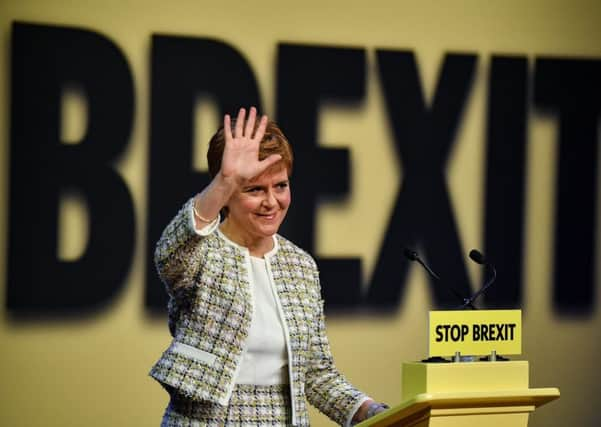Why this general election is all about Brexit - Emily Gray


This is shaping up to be a Brexit election. Ipsos MORI’s most recent poll of voting intentions shows that Brexit is the number one issue that matters to voters in Scotland, with 56 per cent saying the issue is very important in helping them decide how to cast their vote on December 12.
The two parties that are furthest ahead in the polls currently – the SNP, out ahead with a vote share of 44 per cent according to our poll, and the Conservatives on 26 per cent - both have a clear position on Brexit.
Advertisement
Hide AdAdvertisement
Hide AdThis is helping them to pick up a majority of those who voted to Remain in the European Union in 2016, in the SNP’s case, and a majority of Scotland’s Leave voters, in the case of the Tories. In Nicola Sturgeon, the SNP also have the party leader who is most popular among the Scottish public.
Scottish Labour’s election prospects are looking bleak. Our poll has Labour on 16 per cent of the vote, much lower than the 27 per cent share the party managed to achieve at the 2017 election.
Scottish Labour leader Richard Leonard is the least popular of Scotland’s party leaders among the public, with a net satisfaction rating of -33. And his Westminster counterpart isn’t helping him; Scots are now more negative about Jeremy Corbyn than they were back at a similar point in the run-up to the 2017 election, with his personal ratings a sizeable 34 percentage points lower now than they were back then.
Independence is featuring strongly in the campaign, and a third of the public (34 per cent) see it as an issue that will be very important in deciding how they’ll vote. The polls have moved on independence in recent months, to the point that it’s too close to call; Scots are split right down the middle on independence, with 50% saying they’d vote Yes and 50 per cent No if a second referendum were held tomorrow (once those who are undecided are removed). When it comes to holding a second referendum in 2020 though – Nicola Sturgeon’s stated timeframe - more people in Scotland oppose the idea (50 per cent) than support it (42 per cent).
Of course polling only ever provides a snapshot of public opinion at a point in time – and there’s still scope for voters to change their minds in the run-up to polling day. Indeed, we’ve seen that happen more than ever in recent elections, where voter behaviour has been more volatile than previously. What looks certain though is that both Brexit and Scottish independence are set to remain key issues for Scottish voters long after the dust has settled on the election result.
Emily Gray is managing director of Ipsos MORI Scotland
